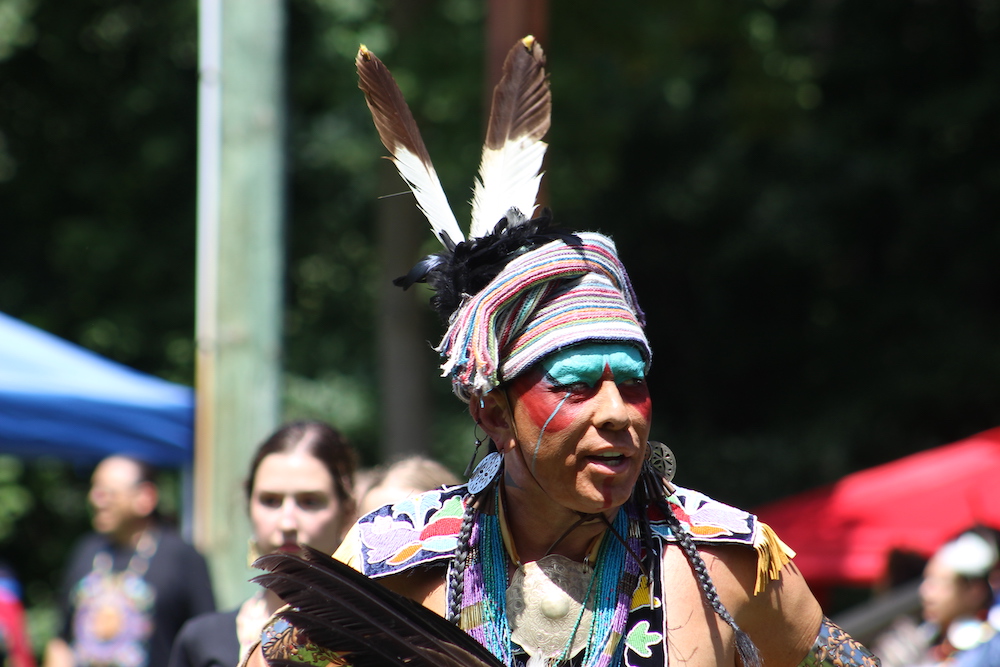U$A
What Native American Heritage Month Means to Me

November is Native American Heritage Month
Guest Opinion. Growing up in the inner city of Grand Rapids, Michigan, my childhood family’s primary community event as Anishinaabe would be to walk down to the Grand River for the September powwow back when it was held at Ah-Nab-Awen Park. This was the one time and place that our very protective mother would relax the creased forehead of her worry and suspicion, as well as her close watch over me and my three sisters.
Not yet dancing, I found myself laughing and running free in the drum circle; ducking into teepees that smelled comfortably of what I now recognize as smudge; and marveling to watch our mother smile, talk, feel at ease with, and just plain know so many people. People who looked like us, and who on that day helped me feel proud and happy to be “Indian.” At a time when the textbooks mentioned our ancestral relatives for maybe two paragraphs in the past tense, next to a mortifying picture depicting a red, scowling figure wielding a hatchet over the heads of some cringing damsels, this experience of joy and belonging was deeply impactful. Self-preservation and shame that had me denying my heritage at school became transformed into excitement and pride next to the river, once a year, on that wonderful weekend.
As I grew into adulthood and took the paths of scholarship and grassroots activism, connections with the Anishinaabe community have become steadily more integrated into daily life experience for me and my own three children. For this I am grateful to all the elders and teachers and culture carriers who have welcomed us in the spirit of love for our teachings and lifeways, motivated to uplift the path of Minobimaadiziwin that together we can make ever more attainable. Living as Anishinaabe provides the foundational intellectual, spiritual, and emotional framework for we the people of the 7th fire who share in the responsibility to turn the current tides back towards restoration and recovery of our lifeways and the lives of all our more-than-human relatives. This is how I begin thinking about the meaning of our ancestral heritage.
As for the meaning of Native American Heritage Month, that can at times feel more complicated, as the marker of a “month” indicates a limited time offer. Does the wording imply that some measure of permission is being given, in contrast to the remaining majority of time marked by erasure, or shame, or embarrassment, or even danger? The sense that this recognition is perhaps used as a consolation is disturbing: the proverbial bone thrown by a dominant culture still normalizing the exploitative and extractive policies of land abuse and displacement. This all can understandably become problematic. The tension of a small window in which to feel pride in identity hearkens back to the imbalances in my own childhood between powwow weekend and the rest of the year, and more painfully to the boarding school era that systematically punished and terrorized children for even the smallest connection to their tribal heritage.
My mother and father met as young children at the Holy Childhood of Jesus Indian Boarding School in Harbor Springs, Michigan. Those traumas disconnected them from experiencing peace in their spirits, because they were not permitted to live as Anishinaabe. They spent their lives injured by an ubiquitous system of soul-killing institutions, doing their best to find solace in the midst of the perpetual home-sickness of cultural alienation steeped in severance from Akiing.
That terrible struggle and pain of so many survivors, and those who never made it back, can perhaps provide us with an empowering way to meet the month of November. When other direct and community descendents of the victims and survivors of ongoing cultural violence and I are approached for comment this one time of year in particular, what does that mean and how ought one respond?
It is a personal decision, foremost, and can also depend on where someone is in their learning or their healing.
For myself, I take it as an opportunity to speak honestly as an Anishinaabekwe, proud to be Mishiike Dodem (Turtle Clan), and ever ready to help us meet our collective responsibilities to protect and restore the land and water at this critical time.
Native American Heritage Month means that more people will be paying attention. That means more ears that might hear us say something that will resonate, and thereby help our more-than-human relatives, our children, and our elders. Dabasendiziwin (humility) keeps us centered in gratitude for the gifts of the living Earth. Fortified by our Grandfather teachings, we can become the necessary link between awareness of heritage and practices of healing.
November is as good a month as any to keep on being exactly who we are.
Dr. Nichole Keway Biber is a tribal citizen of the Little Traverse Bay Bands of Odawa Indians. She serves on the Anishinabek Caucus in Michigan, where she leads the Wolf/Wildlife Preservation Team.
No comments:
Post a Comment